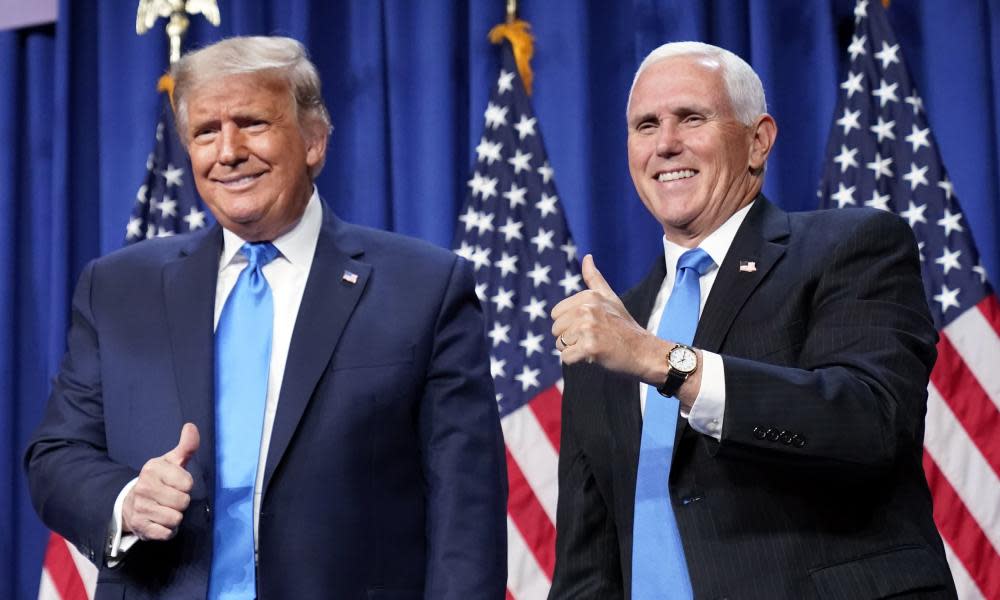CDC's autumn vaccine hint fuels fears of pressure from Trump

Challenged last month on the government’s failure to contain the coronavirus in the United States, Mike Pence, the vice-president, said: “We think there is a miracle around the corner.”
Related: Joe Biden to meet with Jacob Blake's family in Kenosha – live
Pence might have been speaking from more than faith alone. On Wednesday, it emerged that the Centers for Disease Control and Prevention (CDC) had instructed states to prepare to distribute a coronavirus vaccine to healthcare workers and vulnerable populations – just in time for the 3 November election.
For months, critics of the Trump administration have worried that the White House would pressure the Federal Drug Administration (FDA), the CDC and other agencies to rush a hasty coronavirus vaccine to market before the election.
Now it appears that Donald Trump could be in a position – as the confirmed US death toll from Covid-19 approaches 200,000, and just as undecided voters are looking for a sign on which way to swing – to announce that a vaccine is imminent.
Efforts to find a safe and effective US Covid-19 vaccine began the gold standard phase-three trial stage in July.
The potentially propitious autumn timing of a vaccine for Trump does not mean that the vaccine or vaccines would be illegitimate, although federal regulators would have to rush the approvals process to move a coronavirus vaccine to market so quickly.
Scientifically respected voices in the administration, including Anthony Fauci, the top federal infectious diseases expert, have been saying for months that vaccine development was moving swiftly.
At the end of July, Fauci told Congress he was “cautiously optimistic” that a “safe and effective” coronavirus vaccine would be available to the public by the end of 2020. On Thursday, he said that news of a successful vaccine by October was “unlikely, not impossible”.
Any rollout in late October of an initial wave of vaccine doses, for those who need them most, could be in line with the most aggressive vaccine timelines mooted by experts last spring. However, such an event would also dovetail remarkably with Trump’s political needs as the pandemic continues to be out of control in the US.
Critics have been warning for months that Trump could try to rush a vaccine – or exaggerate the magnitude of an initial vaccine rollout, just as he has exaggerated the national testing capacity – in order to win re-election.
Those critics have pointed out that a key agency in the process, the FDA, which would have to grant emergency use approval for any vaccine candidate to be distributed before the full completion of trials, has shown itself vulnerable to political pressure.
After Trump touted the drug hydroxychloroquine as an effective coronavirus treatment, the FDA granted emergency authorization for the drug to be used that way – only to revoke the authorization after two months.
Concerns about the FDA grew at the weekend as its commissioner, Stephen Hahn, told the Financial Times that he was prepared to issue emergency use authorization for a vaccine before the end of phase-three human trials, in which efficacy is tested in tens of thousands of human subjects.
Hahn said the agency’s decision would be based on whether “the benefit outweighs the risk in a public health emergency”.
The CDC did not appear to be advising states that a general rollout of a new vaccine was imminent, instead advising them that a vaccine could be ready soon.
Related: Lack of staff, funds and tools: health officials worry the US isn’t ready for Covid vaccines
The CDC notified public health officials in all 50 states and five major cities to begin making preparations to distribute vaccines, the New York Times first reported. The agency described guidelines for shipping, mixing, storing and administering two unnamed candidate vaccines, the report said.
Days earlier, the CDC director, Robert Redfield, wrote a letter to state governors asking that they “consider waiving requirements” to allow a company with a federal contract to distribute vaccines to set up local facilities.
Vaccine advocates worry that by potentially rushing an ineffective, or worse, dangerous, vaccine to market, the government could fuel vaccine skepticism and leave the population vulnerable to diseases once believed to have been eradicated if it prompts them to avoid other inoculations.
“The president keeps telling us the virus is going to disappear,” Joe Biden said at the Democratic national convention last month.
“He keeps waiting for a miracle. Well, I have news for him: no miracle is coming.”
Officials have also voiced concerned that underfunded state health departments are not ready to be able to distribute and administer a vaccine to the waiting millions.
The White House press secretary, Kayleigh McEnany, on Thursday afternoon dismissed concerns that Trump is pressuring the FDA.
“No one is pressuring the FDA to do anything,” McEnany said.

